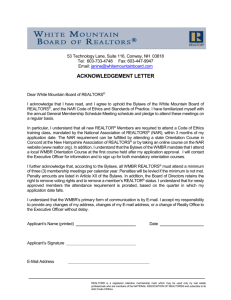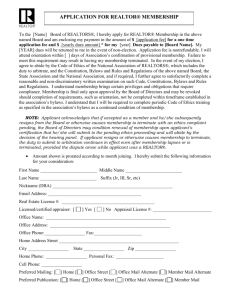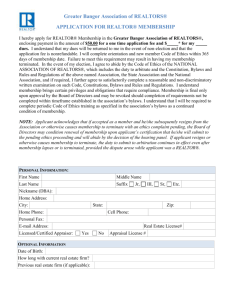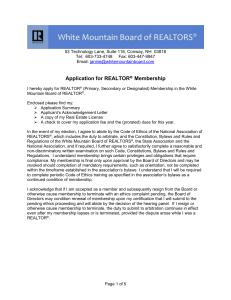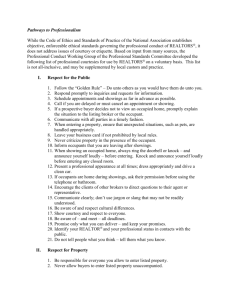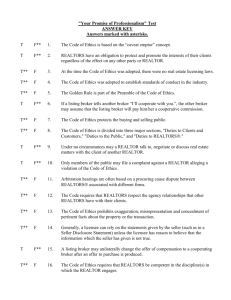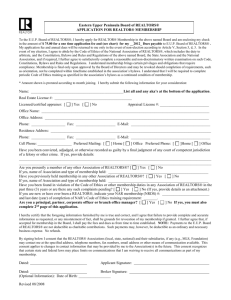Document
advertisement
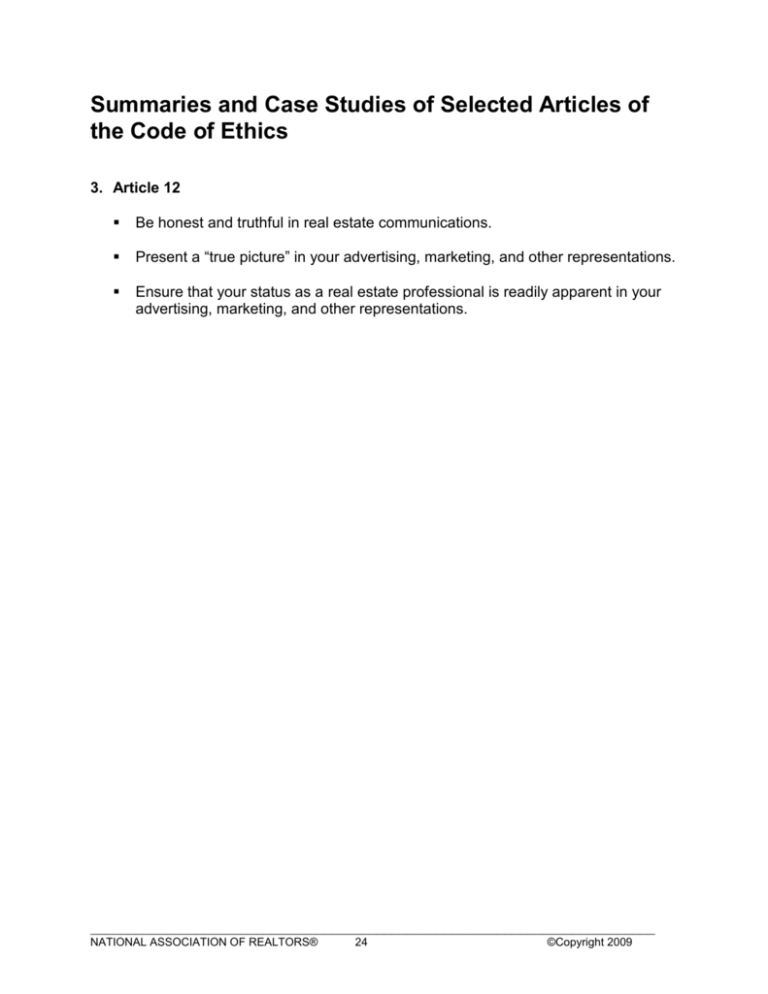
Summaries and Case Studies of Selected Articles of the Code of Ethics 3. Article 12 Be honest and truthful in real estate communications. Present a “true picture” in your advertising, marketing, and other representations. Ensure that your status as a real estate professional is readily apparent in your advertising, marketing, and other representations. ___________________________________________________________________________ NATIONAL ASSOCIATION OF REALTORS® 24 ©Copyright 2009 The REALTORS Code of Ethics Quadrennial Education Program Participant's Guide ____________________________________________________________________________________________ Exercise: Article 12 Case Studies Case #1 (Based on Case Interpretation #12-17) A principal broker of Tech-friendly Realty, REALTOR® Bob is technologically savvy and constantly looking for ways to use the Internet to promote his firm and drive additional traffic to his website. Being an early adapter to the Internet he registered, but did not use, several domain names that incorporated or played on the names of many of his competitors and their firms, including Top Notch, REALTORS®. REALTOR® Bob and his information technology vendor recently came to the conclusion that one way to drive traffic to Tech-friendly Realty’s website is to take better advantage of the search engines commonly used by potential buyers and sellers. They determine that when potential buyers or sellers search on “real estate,” “REALTORS®,” or similar words, lists of related, registered domain names appear. So, REALTOR® Bob decides to activate some of the dormant domain names of his competitors, including the “topnotchREALTORS.com,” and use them to point consumers to his own website. In a matter of days, REALTOR® Bob learns that he had been charged with a violation of Article 12 of the Code of Ethics by the owner of Top Notch, REALTORS®, REALTOR® Sally, who alleges that REALTOR® Bob’s use of the domain name “topnotchREALTORS.com” presents a false picture on the Internet to potential buyers and sellers. During the hearing, REALTOR® Bob defends himself, by saying that in his opinion, using a domain name is not advertising or a representation to the public, but simply a convenient way for Internet users to find relevant Web sites. He goes on to say that, “When Web surfers reach my home page, there is no question, but that it’s my site, because it clearly displays Tech-friendly Realty’s name and status as a real estate firm.” He goes on to say that, “These complaints are just a lot of sour grapes from dinosaurs who don’t keep up with the times, and who don’t realize that on the Internet, it’s every man for himself.” _____________________________________________________________________________ NATIONAL ASSOCIATION OF REALTORS® 25 ©Copyright 2009 The REALTORS Code of Ethics Quadrennial Education Program Participant's Guide ____________________________________________________________________________________________ Case #1 Questions 1. Which Standard of Practice applies to this situation? A. Standard of Practice 12-9 B. Standard of Practice 12-10 C. Standard of Practice 12-11 D. Standard of Practice 12-12 2. Has REALTOR® Bob violated Article 12? A. Yes. B. No. C. Only if using a domain name based on another firm’s name is precluded by law or regulation. D. It depends on the disclosures and any other information displayed on REALTOR® Bob’s Web site. _____________________________________________________________________________ NATIONAL ASSOCIATION OF REALTORS® 26 ©Copyright 2009 The REALTORS Code of Ethics Quadrennial Education Program Participant's Guide ____________________________________________________________________________________________ Exercise: Article 12 Case Studies Case #2 (Based on Case Interpretation #12-19) REALTOR® Owen spots a dilapidated “For Sale” sign on an otherwise attractive wooded lot. He gets out of his car to look closer at the sign, and is barely able to discern REALTOR® Sloan’s name, which he later uses to locate REALTOR® Sloan’s company website on the Internet. Later, when he has a chance to view REALTOR® Sloan’s website, he sees detailed information about the lot. He sends an e-mail to REALTOR® Sloan, requesting lot dimensions and the property’s asking price. Several days later, he receives a response that simply says, “That listing expired.” The day after receiving the e-mail from REALTOR® Sloan, REALTOR® Owen contacts another area broker, REALTOR® Caren, to see if the wooded lot is still available. REALTOR® Caren confirms her firm has had an exclusive listing on the property for the past six months. “That’s funny,” responds REALTOR® Owen, “REALTOR® Sloan has a ‘For Sale’ sign on the property and information about it on his website. I was under the impression he still has that listing.” Although the lot was out of REALTOR® Owen’s price range, the “For Sale” sign and information on REALTOR® Sloan’s website stayed on his mind. Finally, he contacted the local association of REALTORS® and filed an ethics complaint alleging that REALTOR® Sloan’s “For Sale” sign and website information indicates that the property is listed with his firm, but this has not been the case for over six months. REALTOR® Owen writes that in his opinion, REALTOR® Sloan’s conduct violates Article 12, because it does not present a “true picture” in a public representation and is advertising a property without authority, practices both prohibited by Article 12, as interpreted by Standard of Practice 12-4. During the professional standards hearing, REALTOR® Sloan claims that failing to remove the “For Sale” sign simply was an oversight, and if anyone is to blame, it is his personal assistant, Brenda, who is responsible for removing signs and lockboxes from expired and sold listings. He says, “If you want to blame anyone, blame her, since she’s supposed to bring back all of our ‘For Sale’ and ‘Sold’ signs.” REALTOR® Sloan acknowledges that the stale listing information on his Web site continued to appear for more than six months after the listing expired, and compares this to finding outdated property information in an old newspaper advertisement. “It’s possible,” he points out, “that someone might come across a six- month-old newspaper with my listings in it, and those ads were true when I ran them. How can I control when and where someone will come across old newspaper ads, months or even years later?”, he asks. “Besides,” he adds, “REALTORS® have better things to do than constantly monitor their websites to make sure that everything is absolutely, positively up-to-the-minute. If we did that, none of us would have time to list or sell,” he concludes. _____________________________________________________________________________ NATIONAL ASSOCIATION OF REALTORS® 27 ©Copyright 2009 The REALTORS Code of Ethics Quadrennial Education Program Participant's Guide ____________________________________________________________________________________________ Case #2 Questions 1. Is REALTOR® Sloan obligated to keep his company’s listing information up to date on his firm’s website? A. Yes. B. No. C. Only if the same listing information does not also appear in a newspaper. 2. If he is obligated to keep his website current, then how long does REALTOR® Sloan have to remove outdated or expired property information from the website? A. REALTORS®’ websites must be immediately and continuously updated to avoid the inclusion of outdated and misleading information. B. REALTORS® should use reasonable efforts to ensure information on their websites is current and accurate. C. It depends on the multiple listing service’s IDX and VOW Rules. D. Both B and C. E. REALTORS® are not obligated to update the information shown on their websites. 3. When he took the listing, REALTOR® Sloan received permission from the seller to post a sign on the property and to advertise it on his website. Such authority remains in effect even after the listing expires. A. True B. False _____________________________________________________________________________ NATIONAL ASSOCIATION OF REALTORS® 28 ©Copyright 2009
